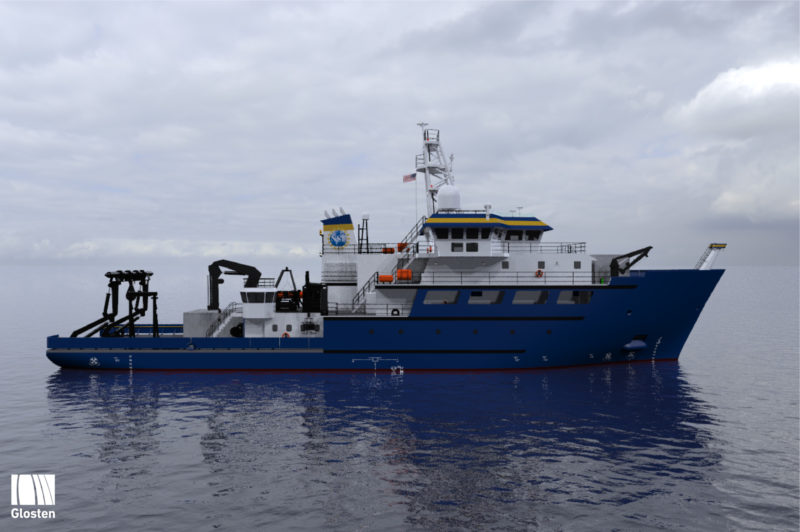Construction officially began yesterday in Houma, La., on the 199' research vessel Resolution, a new research ship being built at Gulf Island Shipyards and for the University of Rhode Island.
The Regional-class research vessel (RCRV) will support scientific studies such as the tracking of ocean currents, ocean-atmosphere interactions, climate-induced changes in the oceans, fish migration, seafloor surveys, conservation of marine mammals, and the food-web dynamics in the deep ocean.
RCRVs conduct operations in the coastal ocean ranging from near-shore environments to the outer continental rise, as well as the open ocean. Resolution’s endurance, draft, ice classification and science mission equipment are tailored for essential science throughout the Atlantic Ocean and adjoining seas.

Rhode Island Gov. Gina Raimondo is joined by URI president David Dooley, GSO Dean Bruce Corliss and chair of the Rhode Island Council on Postsecondary Education Timothy DelGiudice at the May 7, 2019, keel laying ceremony in Houma, La. Crystal Sanderson photo
The 199' Resolution will have a range of more than 5,000 nautical miles, with berths for 16 scientists and 13 crewmembers; a cruising speed of 11.5 knots; and a maximum speed of 13 knots. The ship will be able to stay at sea for about 21 days before returning to port and will routinely send streams of data to shore via satellite.
“The Resolution will carry out scientific expeditions throughout the Atlantic Ocean and adjoining seas over the next thirty years and will be used to conduct a broad range of scientific and environmental studies,” said URI Graduate School of Oceanography Dean and ECOC Director Bruce Corliss. “We are delighted that the Resolution will be operated by the University of Rhode Island and the East Coast Oceanographic Consortium to promote research, education, and outreach collaborations among the member institutions.”
Led by URI’s Graduate School of Oceanography along with two founding members — the Woods Hole Oceanographic Institution and the University of New Hampshire School of Marine Science and Ocean Engineering — the ECOC includes 13 associate members which will have opportunities to conduct research at sea and will collaborate on research, education and outreach activities.
Operated by the East Coast Oceanographic Consortium (ECOC), Resolution will be the second in a series of RCRVs funded by the National Science Foundation (NSF).
NSF selected Oregon State University to lead the design, construction and transition to operations for as many as three new RCRVs for the U.S. Academic Research Fleet, including Resolution.
In 2017, the NCF awarded Oregon State a grant of $122 million to launch the construction of the first of three first-of-a-kind regional class research vessels, representing the largest grant in the university’s history. A year later, the grant was supplemented with an additional $88 million, allowing Gulf Island to proceed with the contract for the second vessel — Resolution. (A third vessel is expected to be awarded sometime this year.)
The RCRVs were designed by Seattle-based Glosten, according to the company's business development manager, Maggie E. Moon “Since 2012, Glosten has worked closely with NSF and Oregon State University to develop this class of vessels. We continue to collaborate with Gulf Island Shipyards as they progress the design through production design,” she said.
No addition specs were released for Resolution, but the first vessel, Taani, which is also being built at Gulf Island Shipyards, will have a 12'6" draft and is scheduled for delivery in March 2021. It will measure 199'6"x41'x19' and have a range of greater than 5,000 nautical miles, with berths for 16 scientists and 13 crew, a cruising speed of 11.5 knots, and a maximum speed of 13 knots.
Gulf Island was the boat’s designer, but the shipyard’s engineering department used a team of other engineering firms as subcontractors, bringing to the project people who specialized in certain design aspects.
“Today’s ceremony marks the start of a new chapter in the rich history of oceanographic research and education at the University of Rhode Island,” said URI president David M. Dooley. “The Resolution will play a central role in building on that important research legacy and in enhancing the educational and research experience of our students for generations to come.”
“The National Science Foundation is pleased to welcome Resolution to the new Taani-class of research vessels,” said Terrence Quinn, director of NSF’s Division of Ocean Sciences. “This is an exciting time as we enhance and update the nation’s Academic Research Fleet and create new opportunities for research, education and outreach in ocean science and exploration.”
Resolution is currently scheduled for delivery to the ECOC in January 2022 with an arrival at its homeport at the URI Narragansett Bay Campus that summer. After an additional six months of outfitting and testing, the ship will be fully operational. At that time, with the approval of NSF, Resolution will receive a University-National Oceanographic Laboratory System (UNOLS) Research Vessel Designation and begin conducting funded science expeditions starting January 2023.





